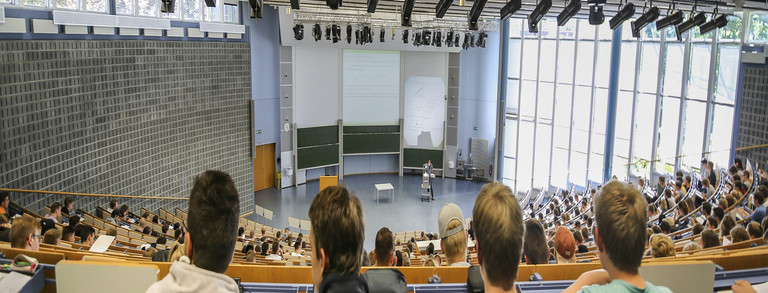Master (1 subject)
The Master’s degree program in Biochemical Engineering is research-oriented. Graduates know and have mastered modern technologies and methods of biochemical engineering and can apply these to the requirements of industrial practice.
to the degree program Biochemical Engineering (Master of Science (M.Sc.))
The Master’s degree program in Business Administration and Economics offers the possibility of specialization in a particular professional field. It can be connected seamlessly to the Bachelor’s degree program, but can also be taken up after a period of practical work experience and appeals to all those who value a practice-oriented, interdisciplinary and internationally oriented education with numerous options.
to the degree program Business Administration and Economics (Master of Science (M.Sc.))
Business mathematicians apply mathematical methods to economic problems.
to the degree program Business Mathematics (Master of Science (M.Sc.))
In the Master’s degree program Chemical Biology, the molecular aspects of life sciences are deepened with regard to the understanding of biological processes and their targeted chemical manipulation. In addition, modern methods of biotechnology and bioanalytics as well as their applications are taught. As the courses are held predominantly in English, students learn to master English technical terms confidently and to apply them in an international environment in their professional life.
to the degree program Chemical Biology (Master of Science (M.Sc.))
The master's program in chemical engineering is research-oriented and qualifies students to work in research and development and to lead larger projects and working groups. The program offers the opportunity to deepen knowledge and skills in the field of chemical engineering in all sub-disciplines represented in Dortmund.
to the degree program Chemical Engineering (Master of Science (M.Sc.))
The Master’s program in Chemistry enables students to expand their knowledge and practical skills with regard to the current state of research in order to work independently, e.g. in the field of research, development, production or analytics. As the courses are mainly held in English, the students learn to master the English technical terms confidently and to apply them in an international environment in their professional life.
In the consecutive Master’s degree program in Civil Engineering, students acquire deeper technical and scientific knowledge, learn the methods needed for the design and dimensioning of buildings and specialize in selected areas. Possible specializations are Structural Engineering, Numerical Mechanics, Resource-efficient Construction, and Construction Management. Having successfully completed the program, graduates hold an excellent professional qualification for structural planning and construction tasks. They can also pursue a further academic qualification in teaching and research by attaining a doctoral degree.
to the degree program Civil Engineering (Master of Science (M.Sc.))
Important facts about Master's programs (1-subject)
- The master's degree is the second qualifying university degree. As a rule, a bachelor's degree has already been successfully completed in advance.
- The standard period of study in the Master's program is at least one and at most two years.
- Depending on the course of study, TU Dortmund University awards the degrees Master of Science (M.Sc.) and Master of Arts (M.A.).
- Within the scope of the 1-subject Master's degree, you will study one course of study.
- The Master's degree enables you to pursue a doctorate.





![[Translate to English:] Partner Four hands are holding the green logo of TU Dortmund University](/storages/tu_website/_processed_/1/d/csm_Partner_Nicole_Rechmann_KW_40b35bb3fd.jpg)




![[Translate to English:] Forschung An apparatus with tubes in a laboratory](/storages/tu_website/_processed_/0/c/csm_Forschung_Juergen_Huhn_cbd34afd6d.jpg)
![[Translate to English:] Studium Five students are sitting in a lecture hall. They are talking to each other.](/storages/tu_website/_processed_/c/9/csm_Studium_FelixSchmale_81d94adc86.jpg)





